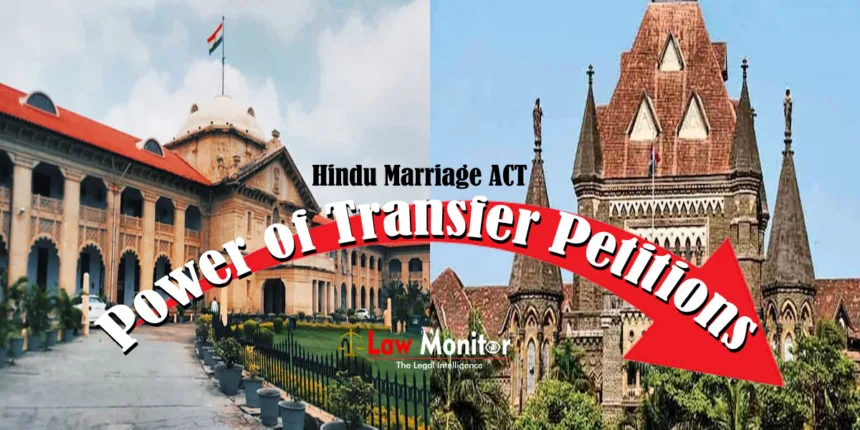This section states that all proceedings under the Hindu Marriage Act, 1955, shall be regulated by the provisions of the Code of Civil Procedure (CPC), 1908.
It ensures that procedural aspects such as filing petitions, service of notices, examination of witnesses, etc., follow the rules established under the CPC.
The Family Courts Act, 1984, also plays a significant role where applicable, as family courts handle matrimonial disputes.
Section 21-A – Power to Transfer Petitions in Certain Cases
Inserted by: The Marriage Laws (Amendment) Act, 1976.
Section 21-A was introduced to address situations where both spouses file matrimonial cases (like divorce or judicial separation) against each other in different courts. This section helps avoid multiple proceedings and conflicting judgments.
Applicability: This section applies when both parties (husband and wife) have filed petitions for judicial separation, divorce, or nullity of marriage in different courts.
Provision: It allows for the transfer of such cases to one court for simultaneous hearing and disposal.
Objective: To avoid conflicting judgments and reduce the burden of multiple proceedings.
Transfer of Petitions:
- One of the parties can apply for the transfer of the case.
- The case will be transferred to the court where the first petition was filed.
- After the transfer, both cases will be heard together in the same court.
Jurisdiction for Transfer:
- If the cases are in different states, the application for transfer should be made to the Supreme Court under Section 25 of the Code of Civil Procedure (CPC), 1908.
- If the cases are within the same state but in different courts, the application should be made to the High Court under Section 24 of the CPC, 1908.
Example to Understand Section 21-A
Scenario: Husband files for divorce in Delhi Family Court first and Wife files for judicial separation in Mumbai Family Court.
Application for Transfer:
- Now, both cases will be heard together in the Delhi Family Court.
- Either party can apply to the Supreme Court (since courts are in different states) to transfer one case.
- The court may transfer the wife’s case from Mumbai to Delhi (where the first case was filed).
Section 21-B – Special Provision Relating to Trial and Disposal of Petitions under the Act
Inserted by: The Marriage Laws (Amendment) Act, 1976.
Expeditious Trial: Mandates that all petitions under the Hindu Marriage Act should be tried as expeditiously as possible.
Timeframe for Trial:
- Once proceedings commence, the trial should ideally be day-to-day without unnecessary adjournments.
- The court should aim to dispose of the case within 6 months from the date of service of notice to the respondent.
- Appeals: Appeals from decisions under this Act should also be disposed of as quickly as possible, preferably within 3 months from the date of service of notice of appeal.
Objective:
To reduce delays in matrimonial disputes, considering the sensitive nature of such cases and the emotional and psychological impact on the parties involved.
Conclusion:
- Section 21 ensures procedural uniformity by applying CPC rules.
- Section 21-A provides for the transfer of related matrimonial cases to prevent conflicting judgments.
- Section 21-B focuses on the speedy trial and disposal of matrimonial petitions to reduce the emotional burden on the parties.
Read Also: Court to which petition shall be presented



